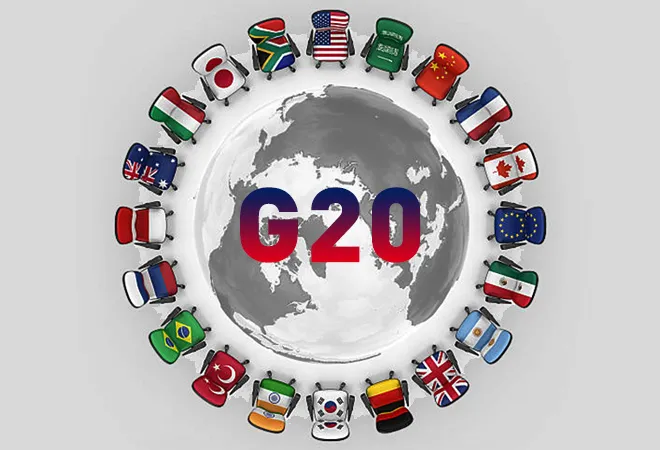-
CENTRES
Progammes & Centres
Location
Under India’s G20 presidency in 2023, it has the opportunity to advance digital financial inclusion in the agenda to allow an inclusive COVID-19 recovery.

Access to affordable financial services can help spur economic growth, reduce inequality, and improve individuals’ resilience to financial risks. It is directly linked to smoother consumption, increased investment in education and health, and greater inclusion in financial markets around the world. Digitalisation can be a key enabler of financial inclusion and play a crucial role towards an inclusive recovery from the pandemic. It has proved to be invaluable for governments’ response to the COVID-19 crisis, particularly in reaching the vulnerable and underserved groups by enabling last-mile access to financial resources.
However, according to the World Bank’s Findex Database, 1.7 billion adults or almost half of the global adult population lack any access to financial services provided by regulated financial institutions. In total, about 56 percent of the unbanked individuals were women and half of them belonged to the poorest 40 percent of the household. Despite the availability of basic account ownership, access to a broader range of financial services still remains a challenge. The pandemic-induced social distancing norms have further underscored the need to provide digital financial services.
Digitalisation can be a key enabler of financial inclusion and play a crucial role towards an inclusive recovery from the pandemic.
Over the years, recognising the challenges, the G20 has taken forward the agenda of financial inclusion through the implementation of various initiatives such as the setting up of the Global Partnership for Financial Inclusion (GPFI), the G20 High-Level Principles for Digital Inclusion (HLP), and the G20 Financial Inclusion Action Plan 2020. Furthermore, as the G20 president in 2022, the Indonesian G20 Presidency has upgraded the Digital Economy Task Force to a Digital Economy Working Group and identified ‘digital financial inclusion’ and ‘payment system in the digital era’ as the key priorities under the G20’s finance track for 2022.
It is important for the G20 countries to coordinate their efforts towards providing an inclusive, enabling and fair digital economy by urging the members to support the promotion of a digital approach to financial inclusion. Although the agenda of enabling an inclusive digital economy is directly linked to digital financial inclusion, the G20 digital financial inclusion agenda is fragmented across its Sherpa and Finance Track. While the financial inclusion mandate comes within the GPFI under the G20 Finance Track, the Digital Economy Working Group constitutes a part of the Sherpa Track. It would be worthwhile to consider integrating the agenda for digital financial inclusion under the newly upgraded Digital Economy Working Group.
Given that the G20 will be led by three emerging economies over the next three years— Indonesia, India, and Brazil— it is an opportunity for India to further the agenda of adopting digital financial inclusion as a means to encourage inclusive recovery from the pandemic. Under its G20 Presidency in 2023, the key digital financial inclusion policy objectives that India can focus on can be leveraging large recurrent payments and providing consumer protection.
Although the agenda of enabling an inclusive digital economy is directly linked to digital financial inclusion, the G20 digital financial inclusion agenda is fragmented across its Sherpa and Finance Track.
At the G20, India can focus on the need to leverage large recurrent digital payments to encourage digital financial inclusion by establishing market acceptance, trust, and promoting high-volume business cases. An open and inclusive payments system can increase the digital payment volumes and enhance the economic participation of those who lack any access to formal financial services. A common GPFI’s HLP 1-approach focuses on leveraging Government-to-Person (G2P) payments and introducing a legal, digital identity to encourage financial inclusion. By providing greater investment in infrastructure and transaction accounts, the G2P payments have the potential to drive financial inclusion. The large scale recurrent payments in the form of social benefits, wages, and pensions can deepen the national retail payment systems.
India’s Direct Benefit Transfer (DBT) and AADHAAR (digital identity) is representative of how public digital platforms can be utilised to enable government response to the disruption of livelihoods and economies through digital financial inclusion during COVID-19. In FY 2020-21, about INR 5.53 trillion was digitally transferred across 319 government schemes through DBT during the pandemic—with DBT for Public Distribution System (PDS) accounting for nearly INR 1.67 trillion. In Brazil, COVID-related G2P payments were made available through state-owned bank, Caixa Economica Federal (CEF), into digital accounts—about 68.3 million people were sent COVID-19 emergency funds and almost 14 million individuals entered the formal financial system for the first time due to this programme. Similarly, Mexico, South Africa, and others have utilised electronic G2P payments as a catalyst for promoting digital financial services. Under the Digital Economy Working Group, India can promote the collaboration between G20 member countries’ policymakers, central banks, and regulatory authorities to ensure that national strategies incorporate and leverage recurrent digital transactions in the form of G2P payments, especially to the vulnerable populations such as the elderly, women, youth, and economically disadvantaged.
By providing greater investment in infrastructure and transaction accounts, the G2P payments have the potential to drive financial inclusion.
Furthermore, remittances are often central to digital payments for low-income individuals. The G20 GPFI HLP recommends encouraging and facilitating recurrent payments digitally in the form of remittances. Digitalisation can facilitate a faster and easier remittance process—increasing the recurrent payments and volume of funds. Remittances can also reinforce the linkage between investment, saving, and insurance. The G20 can focus on the need to provide an enabling regulatory framework, build technology solutions, and facilitate digital remittance flows to encourage recurrent payments for digital financial inclusion. By facilitating digital remittance flows, India and other G20 countries can not only provide an opportunity to bridge gaps in their digital financial services but also formalise the transaction channels for cross-border payments.
However, G2P and digital payments face several challenges in developing countries—a survey in India indicated that most merchants and their customers perceived cash as more convenient than digital channels due to unreliable electricity, slow internet, and difficulties while using point-of-sale terminals. Thus, recurrent digital payments to ensure digital financial inclusion can only be effective as long as they are coupled with efforts to improve the key enablers such as—accessibility to digital infrastructures, connectivity, digital skills, and financial consumer protection.
With the development of the digital economy and digital financial services, there is an increase in the risks associated with new digital technologies. The GPFI has highlighted that digital technology risks can occur across digital financial services and markets value chain including—operational, credit, liquidity, consumer, anti-money laundering, and financing of terrorism (AML/CFT).
Moreover, with a reduction in the human interface while offering digital financial services, it is crucial to appropriate a new set of international standards or ‘code of conduct’ for product and delivery design. The G20 Menu of Policy Options under the G20 Italian Presidency recommended adopting the ‘protection by design’ approach to encourage an inclusive approach towards designing new digital financial products and services that would prevent unfair and aggressive market practices and ensure legitimate use of customer data.
India along with the G20 members must aim at improving the level of financial literacy and ease of digital interface to minimise the risk of unauthorised transactions and illegal use.
Under its G20 Presidency, India must highlight the need to develop a robust approach to ensure consumer protection. India along with the G20 members must aim at improving the level of financial literacy and ease of digital interface to minimise the risk of unauthorised transactions and illegal use. It is crucial for the G20 members to adopt a framework that provides adequate AML/CFT safeguards and consumer protection. Such a framework must not only ensure maintaining minimal AML/CFT requirements but also allow for innovation, competition, and a fair level-playing for digital financial inclusion to the digital service providers. Together, the G20 members can facilitate shared experiences, best practices for consumer protection, supervisory approaches, data policy, and build on existing instruments. Furthermore, G20 members must promote a policy and regulatory environment which provides a grievance mechanism and is easily accessible to consumers and industry. Cybersecurity is another major area of concern, which can pose a great threat to the growth of the digital economy and digital payments. Thus, there is an urgent need to address these areas of concern through international cooperation. India, along with the other G20 members can together promote multistakeholder discussions to create a common cybersecurity framework to set international regulations and protocols that could be incorporated into national regulatory systems.
Digital financial inclusion is crucial for the overall growth of the global digital economy. To ensure an inclusive and robust COVID-19 recovery, the G20 should further the agenda of adopting financial inclusion as a public good, fuelled by the increasing digital transformation. The G20 platform provides an opportunity to the three upcoming G20 presidencies to identify opportunities for resource mobilisation and coordination to enable financial inclusion through digitalisation.
The views expressed above belong to the author(s). ORF research and analyses now available on Telegram! Click here to access our curated content — blogs, longforms and interviews.

Shruti Jain was Coordinator for the Think20 India Secretariat and Associate Fellow Geoeconomics Programme at ORF. She holds a Masters degree in Public Policy and ...
Read More +